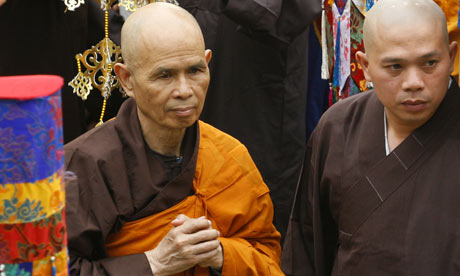 The Zen teacher Thich Nhat Hanh explains in his new book how a Buddhist approach could benefit ecology.
The Zen teacher Thich Nhat Hanh explains in his new book how a Buddhist approach could benefit ecology.
The Zen teacher Thich Nhat Hanh has turned his attention to how Buddhism could help ecology.
There is something extraordinarily child-like about the 84-year-old Zen Buddhist master Thich Nhat Hanh.
To portray him out of context could make him appear naive and unworldly. It is therefore understandable that he does not like to be interviewed by journalists who have not already spent some time in his presence and meditated with him. The Daily Mirror was interested in running a piece only if they could get a picture of him with a major celebrity, which is not particularly helpful since he believes fame is one of the key paths to suffering.
After a rare private audience and five days in a retreat in Nottingham which nearly a thousand other people took part in, I have come to recognise that his way of being could be an antidote to our politicised and intellectualised world.
He has an uncanny ability to clear away the complexities of our lives by reminding us to think about the essence of who we are and offering some simple steps to challenge our habitualised problems and neuroticism.
In recent years, he has turned his full attention to the dangers of climate change and recently published the best-selling book The World We Have – A Buddhist Approach to Peace and Ecology.
He discusses in the book how he sat and consulted with the Buddha for many hours and came away with the recognition that we could be facing the end of our civilisation unless we can achieve a spiritual awakening and change our individual and collective behaviour.
"In my mind I see a group of chickens in a cage disputing over a few seeds of grain, unaware that in a few hours they will all be killed," he writes. Read more...